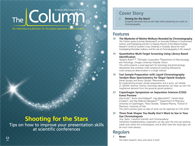Analytical Chemists to Receive ACS Awards
The American Chemical Society (ACS) 2018 National Awards will be presented at a ceremony on 20 March in conjunction with the 255th ACS National Meeting in New Orleans, USA.
Photo Credit: David M.Schrader/Shutterstock.com

The American Chemical Society (ACS) 2018 National Awards will be presented at a ceremony on 20 March in conjunction with the 255th ACS National Meeting in New Orleans, USA. The ACS National Awards programme is designed to encourage the advancement of chemistry in all of its branches, to support research in chemical science and industry, and to promote the careers of chemists. Among the recipients are several analytical scientists.
Joseph J. Pesek of San Jose State University in San Jose, California, USA, will receive the ACS Award for Research at an Undergraduate Institution. Pesek, a professor of analytical chemistry, is interested in the development, characterization, and applications of separation materials for chromatographic and electrophoretic processes. He is particularly well known for the development of silica hydride-based stationary phases for liquid chromatography (LC). His publications include more than 230 works. The award is sponsored by the Research Corporation for Science Advancement.
The ACS Award in Analytical Chemistry will be awarded to Michael Lawrence Gross, a chemistry professor at Washington University in St. Louis, Missouri, USA. His main research goal is the development of biophysical methods that use mass spectrometry (MS) to understand proteins, their interfaces, solvent accessibility, affinities of binding, and their folding and unfolding. The award is sponsored by the Battelle Memorial Institute.
The Frank H. Field and Joe L. Franklin Award for Outstanding Achievement in Mass Spectrometry will be presented to Carol Vivien Robinson of the University of Oxford in the UK. A Dame Commander of the Order of the British Empire, Robinson is the first female professor of chemistry at the University of Oxford and was previously the first female professor of chemistry at the University of Cambridge. She is known for pioneering the use of MS as an analytical tool and for her groundbreaking research into the three-dimensional structure of proteins. The award is sponsored by Waters Corporation.
For more information, please visit https://www.acs.org/content/acs/en/funding-and-awards/awards/national/recipients/2018-national-award-recipients-citations-.html

A Novel LC–QTOF-MS DIA Method for Pesticide Quantification and Screening in Agricultural Waters
May 8th 2025Scientists from the University of Santiago de Compostela developed a liquid chromatography quadrupole time-of-flight mass spectrometry (LC–QTOF-MS) operated in data-independent acquisition (DIA) mode for pesticide quantification in agriculturally impacted waters.
Investigating 3D-Printable Stationary Phases in Liquid Chromatography
May 7th 20253D printing technology has potential in chromatography, but a major challenge is developing materials with both high porosity and robust mechanical properties. Recently, scientists compared the separation performances of eight different 3D printable stationary phases.

.png&w=3840&q=75)

.png&w=3840&q=75)



.png&w=3840&q=75)



.png&w=3840&q=75)











